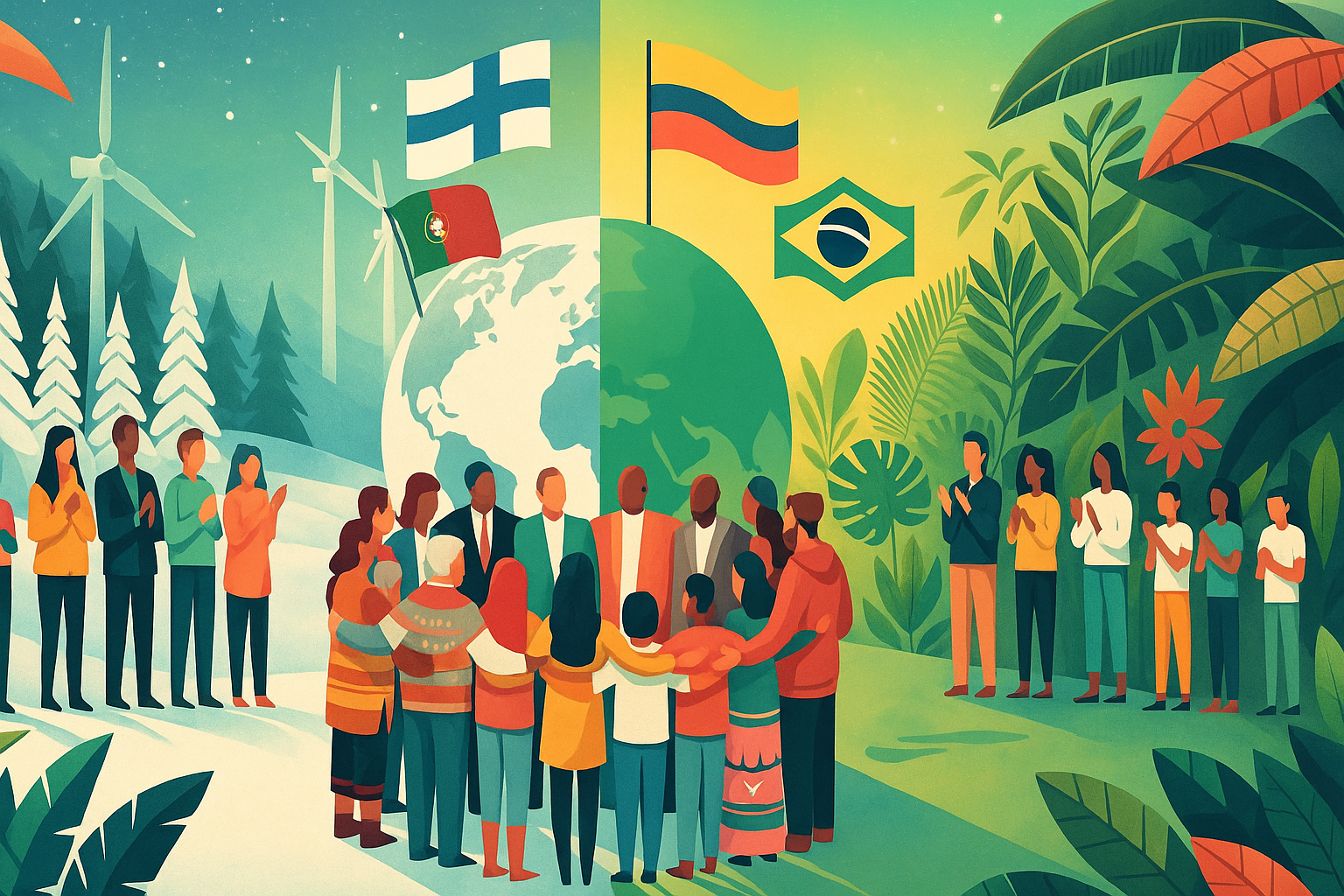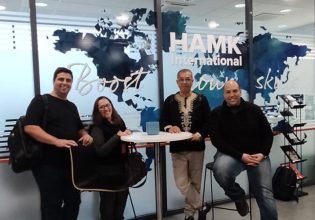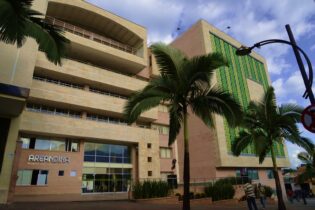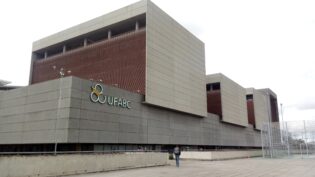Between Northern Lights and Digital Clicks: Why Teaching Is Also About Continuing to Learn (V.8, N.7, P.8, 2025)
Published 6 August 2025

Photo by: ChatGPT
The article highlights the importance of continuous teacher training, using Finland and the international EMBRACE project as examples. The initiative promotes inclusive and collaborative learning ecosystems in Brazil, Colombia, and Europe, fostering teacher development through technology, internationalization, and co-creation tailored to diverse contexts.
#foreveryonetosee: The image generated in partnership with AI ChatGPT is divided into two scenes: on the left, the natural beauty of the European winter, and on the right, the colors and tropical heat of South America. It illustrates the different contexts and countries participating in EMBRACE, represented in this case by the flags of Finland, Portugal, Colombia, and Brazil. People representing the diversity of the project’s participating teams occupy each scene and also the center of the image, embracing in a circle, alluding to the welcoming and collaboration that underpins the EMBRACE project.
Imagine a world where teachers are not seen as “walking repositories of content,” but as navigators of an ever-changing era. A place where teaching demands more than chalkboard and chalk—it demands listening, reinvention, and, who would have thought, even a touch of instructional design. Now take a deep breath, put on an imaginary coat, and travel with us to Finland, where, contrary to what they say about the cold freezing ideas, the exact opposite is true.
In the land of the northern lights and warm cinnamon coffee, being a teacher is almost as prestigious as being an astronaut. There, knowing how to teach isn’t enough: you need to study extensively before even setting foot in a classroom. And then? Continue studying, reflecting, and testing new ways to captivate young minds with the most meaningful things. Sounds obvious? Not so much. In many places around the world—and here in Brazil, too—an educator’s training ends before their journey even begins.
This is where the provocation comes in: who cares about the learning of those who teach?
Perhaps this is why Andreas Schleicher, creator of PISA and director of education at the OECD, stated with almost surgical precision:
“The quality of a country’s education will never be greater than the quality of its teachers.”
And quality, as we know, doesn’t spring from a decree. It needs to be cultivated—with time, support, listening, recognition, and, of course, real opportunities for development. Finland understood this decades ago. It offered free, cutting-edge education, social policies that support families, and an educational system that respects the time of each child… and each educator.
But you don’t need to be surrounded by reindeer to innovate. In the southern hemisphere, where the warm breeze blends accents and hopes, a movement is emerging that looks to the future with both feet in the classroom: the EMBRACE project.
It’s not the name of a romantic song, although it has rhythm, connection, and lots of people dancing along. EMBRACE is an international consortium that unites institutions from Brazil, Colombia, and Europe, including UFABC, around an ambitious goal: to create learning ecosystems for a more meaningful, inclusive, collaborative, and… vibrant higher education.
Under Finnish coordination (yes, them again!), the initiative focuses on continuing education, open courses (the famous MOOCs), internationalization, and the strategic use of technology. All of this is seasoned with a healthy dose of active listening, networking, and co-creation. No copying and pasting ready-made solutions from the Northern Hemisphere—the project understands that each university has its own culture, its own challenges, and its own people.
At UFABC, faculty members have become institutional developers and experts, immersed themselves in bilingual training, created courses focused on digital and pedagogical skills, and, most importantly, they have become multipliers of a mindset that sees digital not as a threat, but as a bridge. One that understands that the 21st-century teacher is not a lone superhero, but part of a constantly evolving network.
Between meetings in Vitória, Espírito Santo, meetings in Hämeenlinna, Finland, extensive group work in Pereira, Colombia, and initial results in the form of MOOCs available in Portuguese, English, and Spanish, the EMBRACE project has been sowing the seeds of the idea that learning—like teaching—is a process with no finish line. It truly is an “embrace”: between knowledge, cultures, generations, and possible futures.
Perhaps the greatest lesson, coming from both Nordic, European, and Latin American experiences, is this: teachers need time to learn. Time to experiment. Time to make mistakes. Time to breathe between classes and ask: “How can I teach this more meaningfully?”
And how wonderful that there are projects and initiatives that answer: “Let’s discover together?”
To Learn More:
The UFABC team’s continuing education experience and the development of MOOC courses in the EMBRACE project, available at: https://www.ufabc.edu.br/noticias/experiencia-de-formacao-continuada-docente-da-equipe-ufabc-e-a-elaboracao-de-cursos-mooc-no-projeto-embrace



